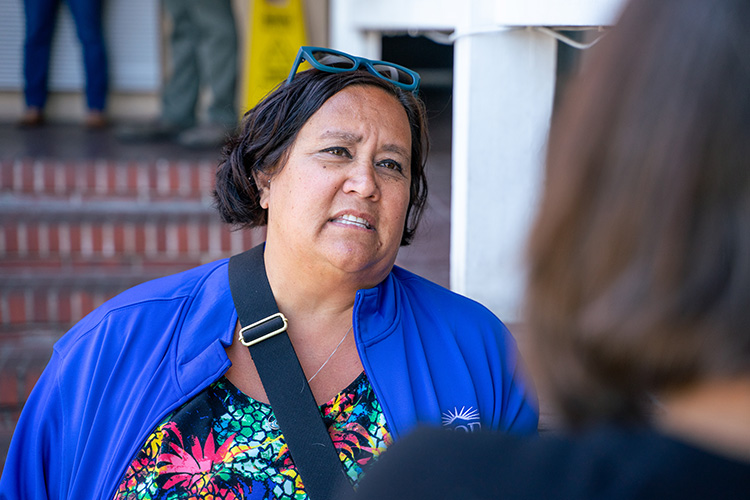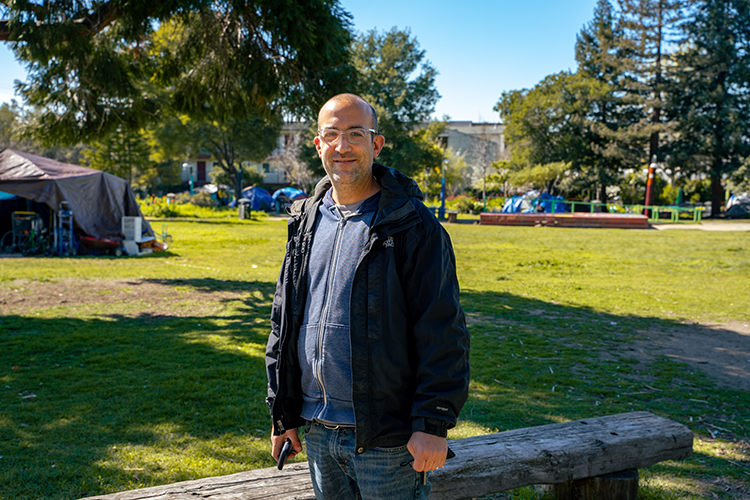State leader visits Berkeley, praises novel partnership to help the unhoused
The state agency leader tasked with finding solutions to expand affordable housing and help solve homelessness in California made a stop at People’s Park on Friday, then at the future site of a drop-in center and at a Berkeley motel where novel partnerships between UC Berkeley, the city and nonprofits are launching programs to care for the park’s unhoused individuals.
The 2.8-acre historied park will close this summer so that work can begin on urgently-needed Berkeley student housing and an open space revitalization project. Last fall, Chancellor Carol Christ promised that construction won’t start at People’s Park until the people in tent encampments and others spending daytime hours on the campus park’s grounds are accommodated.
This week, the first 13 of 43 unhoused people from the park who will live at the Rodeway Inn on University Avenue in an 18-month transitional housing program were individually transported with their belongings to the motel by campus staff in a pickup truck. The other 30 people will make the transition, in stages, over the coming six weeks.
Lourdes Castro Ramírez, secretary of the state Business, Consumer Services and Housing Agency, ended her trip to Berkeley from Sacramento with a noontime outdoor meeting at the motel. There, at a table in the tidy parking lot, with a clear view of where the park’s residents will live and receive support services, she spoke with representatives from the city of Berkeley, UC Berkeley, and nonprofits Abode Services and Village of Love.

Rooms for 43 people who have been living in People’s Park are ready for occupancy and include a bed, microwave, mini refrigerator, TV and bathroom. (UC Berkeley photo by Neil Freese)
Afterward, she was shown one of the shipshape rooms — each outfitted with a bed, TV, microwave, mini refrigerator and bathroom — where Abode Services is helping newcomers get settled and assigning them to navigators who will assist them in finding stable, permanent housing and in achieving career, health and other goals.
“There are some really unique approaches and strategies that this collaborative group of folks is leading, really cutting-edge,” said Castro Ramírez. “I look forward to following up, particularly as the process begins” and when the new residents from People’s Park are further along in the program.
Statewide, she added, “encampments are places people call home right now, but they are not dignified, safe places for housing.”
Ruben Lizardo, Berkeley’s director of local government and community relations, attended the meeting and said the collaborators were thrilled to hear Ramírez say that the $4.7 million grant the city received for the project was one of the largest grants given by the state’s $50 million pilot Encampment Resolution Grant program.
The city is leasing the Rodeway Inn for the first year of the program, paying for the motel rooms and Abode’s services with the state grant money. The campus has committed approximately $2.2 million to cover expenses during the remaining six months of the project.

Kara Carnahan is the vice president of programming for Abode Services, a nonprofit headquartered in Fremont that helps low-income, unhoused people find stable, supportive housing. (UC Berkeley photo by Neil Freese)
Castro Ramírez said the sizable grant was awarded “because we had the most comprehensive strategy of anyone else in the state who applied. She was also impressed that the city had a university partner,” said Lizardo. “No one else who applied for a grant had a social worker and had dedicated land for supportive housing and was working with city and nonprofit partners on this urgent issue.
“That’s why she wanted to visit today: No one else had the partners we have.”
Lizardo credited the city, in particular Peter Radu, assistant to the city manager of Berkeley, for “taking the lead going after the money to help us get people out of the park and into temporary housing and to include a daytime drop-in center, as well as nonprofit partners with a strong history of working with the community.”
The Sacred Rest Daytime Drop-in Center will open around June 15, ahead of schedule, in outdoor space made available by the First Presbyterian Church of Berkeley, which is blocks from People’s Park, to provide services to people who gather at the park during the day and to others in need in the area, said Joey Harrison, executive director of the nonprofit Village of Love, after the meeting on Friday.
UC Berkeley funded the design, site preparation and construction of the drop-in center. With a two-year, $500,000 campus grant and $250,000 from the city, Village of Love will operate Sacred Rest, which will offer light refreshments, help locating housing, access to health care provided by partner organizations, and other services.

Ari Neulight, a social worker hired by UC Berkeley to do outreach to unhoused people on campus property and in the surrounding community, is helping people living in People’s Park make the transition to the Rodeway Inn. (UC Berkeley photo by Neil Freese)
Berkeley Vice Mayor Kate Harrison, also at the Rodeway Inn meeting, praised the university and city team for recognizing the need for the unhoused individuals moving in to bring their belongings and pets — five dogs have joined their guardians at the motel this week — and for its focus on “handling the people living in the park in a sensitive manner; that made me feel better.
“The university is not just throwing away people’s belongings and breaking up their encampment. And I did see a man moving in with two dogs. If you’re separated from the only companion you have, you won’t want to move inside (the motel).”
“UC Berkeley’s slowly moving people out,” she added, “and they have Ari to help.”
Harrison was referring to Ari Neulight, the social worker that the campus creatively hired in 2017 as its homeless outreach coordinator. Neulight is working personally with each of the People’s Park inhabitants who are moving into the Rodeway Inn. Many of them have lived 24/7 at the park during the pandemic.
Harrison also said she was delighted to meet members of the Abode Services team who, in their royal blue uniforms, answered questions from the state, city and county representatives, gave tours of a room and spoke glowingly of the new residents they’re getting to know.

Lourdes Castro Ramírez greets an Abode Services staffer, Epsilon Galloway, at the Rodeway Inn. Next to Galloway is Ari Neulight, the campus’s homeless outreach coordinator, and to the right of Castro Ramírez is Joey Harrison, who will run the daytime drop-in center for people who currently spend their days in People’s Park. (UC Berkeley photo by Neil Freese)
Kara Carnahan, vice president of programming for Abode, said the people who moved in this week have had a “super smooth” experience so far. Each of them has received a personal navigator and three meals delivered daily. Some are finding camaraderie outdoors, by the front gate, with their pets and a cup of coffee in the morning.
“This week needs to be about welcoming and building relationships,” she said, acknowledging that many of the newcomers are skeptical of the program, but that she’s hearing “many positive things,” too, as they begin to settle in.
As she readied for the trip back to the state Capitol, Castro Ramírez said she better understood “the commitment from UC Berkeley, not just in terms of being a partner on paper, but one in which the university has dedicated staff who are integrated with the city and the county and the church and social services, an integrated team working very much with a people- and community-centered approach.”
She said she would take the opportunity “to share this approach and model with other universities that are also being impacted” by the homeless crisis.
Other universities in California “are in cities where homelessness is a huge problem,” added Lizardo. “Under Chancellor Christ’s leadership, UC Berkeley is the first university to say that even though our charge is to educate the state’s students, we are not exempt from taking steps to meet the needs of the homeless people in our community. The chancellor said, ‘I’m going to work on this,’ and has kept her word, not just with this important effort, but also through the plan she launched for a second housing project at People’s Park.”
That project, which will start after the student housing facility project begins, includes supportive housing for people who are unhoused or with very little income. It will be built and operated by Resources for Community Development, a local nonprofit housing organization.

